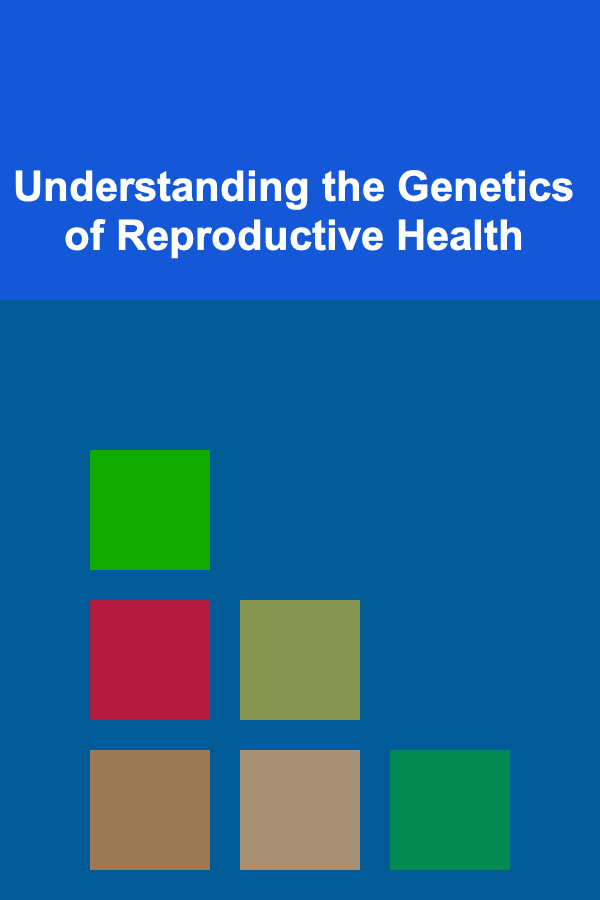
Understanding the Genetics of Reproductive Health
ebook include PDF & Audio bundle (Micro Guide)
$12.99$7.99
Limited Time Offer! Order within the next:

Reproductive health, encompassing fertility, pregnancy, and the overall well-being of the reproductive system, is a complex interplay of genetic, environmental, and lifestyle factors. While lifestyle and environment play significant roles, genetics provides the fundamental blueprint, influencing susceptibility to various reproductive disorders, influencing the timing of puberty, and even impacting the effectiveness of fertility treatments. Understanding the genetic basis of reproductive health allows for improved diagnostics, personalized treatment strategies, and informed family planning.
The Basics of Reproductive Genetics
To delve into the genetics of reproductive health, it's essential to understand some fundamental genetic concepts:
- Genes: Genes are the fundamental units of heredity, composed of DNA sequences that encode proteins or functional RNA molecules. These proteins and RNA molecules carry out essential functions in the body, including those related to reproduction. Specific genes are critical for hormone production, gamete (egg and sperm) development, and the structural integrity of the reproductive organs.
- Chromosomes: Humans have 23 pairs of chromosomes, totaling 46. One set is inherited from each parent. These chromosomes contain the genes. The 23rd pair are the sex chromosomes, XX for females and XY for males, which determine sex and influence sex-linked traits.
- Mutations: Mutations are changes in the DNA sequence. They can be inherited from parents (germline mutations) or occur spontaneously during an individual's lifetime (somatic mutations). Some mutations are harmless, while others can significantly impact gene function and lead to reproductive disorders.
- Inheritance Patterns: Genetic traits are inherited in various patterns:
- Autosomal Dominant: Only one copy of the mutated gene is needed to express the trait.
- Autosomal Recessive: Two copies of the mutated gene are needed to express the trait. Individuals with one copy are carriers.
- X-linked: The gene is located on the X chromosome. Males, having only one X chromosome, are more likely to be affected by X-linked recessive disorders.
- Y-linked: The gene is located on the Y chromosome. These traits are only passed from father to son.
- Mitochondrial: Genes located in the mitochondria are inherited only from the mother.
- Multifactorial: Traits are influenced by multiple genes and environmental factors. Many reproductive disorders fall into this category.
- Genotype and Phenotype: Genotype refers to an individual's genetic makeup, while phenotype refers to the observable characteristics. A particular genotype may not always result in a specific phenotype due to factors like environmental influences or gene interactions.
Genetic Disorders Affecting Female Reproductive Health
Several genetic disorders can significantly impact female reproductive health, affecting fertility, pregnancy, and overall well-being.
Chromosomal Abnormalities
Chromosomal abnormalities, involving changes in the number or structure of chromosomes, are a leading cause of infertility and pregnancy loss.
- Turner Syndrome (45, X): This condition affects females and is characterized by the absence of one X chromosome or a structural abnormality of one X chromosome. It often leads to ovarian insufficiency, resulting in infertility, and can cause other health problems, including short stature and heart defects. Many women with Turner syndrome require hormone replacement therapy and assisted reproductive technologies (ART) like egg donation to achieve pregnancy.
- Triple X Syndrome (47, XXX): Females with Triple X syndrome have an extra X chromosome. Many women with this condition have normal fertility, but some may experience premature ovarian failure or learning difficulties.
- Chromosome Translocations: Translocations involve the exchange of genetic material between chromosomes. Balanced translocations, where no genetic material is lost, may not affect the individual carrying the translocation, but they can increase the risk of miscarriages and the birth of children with unbalanced chromosomal abnormalities.
Single-Gene Disorders
Mutations in single genes can also lead to a variety of reproductive problems.
- Fragile X Syndrome: While more commonly known for its impact on cognitive development, Fragile X Syndrome, caused by a mutation in the FMR1 gene on the X chromosome, can also lead to premature ovarian insufficiency (POI) in females. POI is characterized by the cessation of ovarian function before age 40. Some women with the Fragile X premutation (a less severe form of the mutation) also experience Fragile X-associated tremor/ataxia syndrome (FXTAS) which can impact overall health and potentially reproductive decisions.
- Cystic Fibrosis (CF): Although primarily affecting the lungs and digestive system, CF, caused by mutations in the CFTR gene, can also impact female fertility. Thickened cervical mucus can hinder sperm transport, making conception more difficult.
- Congenital Adrenal Hyperplasia (CAH): CAH is a group of genetic disorders that affect the adrenal glands, leading to hormone imbalances. The most common form, 21-hydroxylase deficiency, can cause virilization (development of male characteristics) in females, irregular menstrual cycles, and fertility problems.
Multifactorial Disorders
Many common reproductive disorders are influenced by a complex interplay of genetic and environmental factors.
- Polycystic Ovary Syndrome (PCOS): PCOS is a common endocrine disorder characterized by irregular periods, polycystic ovaries, and hyperandrogenism (elevated levels of male hormones). While the exact genetic causes of PCOS are not fully understood, research suggests that multiple genes are involved, influencing insulin resistance, androgen production, and ovarian function. Environmental factors like diet and exercise also play a significant role.
- Endometriosis: Endometriosis is a condition where tissue similar to the lining of the uterus (endometrium) grows outside the uterus, causing pain, inflammation, and infertility. Studies suggest a genetic predisposition to endometriosis, with genes involved in inflammation, immune function, and hormone signaling likely playing a role.
- Uterine Fibroids (Leiomyomas): Uterine fibroids are noncancerous growths in the uterus that can cause heavy bleeding, pelvic pain, and infertility. Genetic factors contribute to the development of fibroids, with some genes implicated in cell growth and extracellular matrix regulation.
Genetic Disorders Affecting Male Reproductive Health
Genetic factors play a crucial role in male fertility and reproductive function.
Chromosomal Abnormalities
Chromosomal abnormalities can significantly affect sperm production and male fertility.
- Klinefelter Syndrome (47, XXY): Males with Klinefelter Syndrome have an extra X chromosome. This condition often leads to low testosterone levels, impaired sperm production (azoospermia or severe oligospermia), and infertility. Testosterone replacement therapy can help manage some symptoms, but ART, such as testicular sperm extraction (TESE) followed by intracytoplasmic sperm injection (ICSI), is often necessary to achieve biological fatherhood.
- Y Chromosome Microdeletions: Microdeletions on the Y chromosome, specifically in the azoospermia factor (AZF) region, are a common cause of male infertility. These deletions can disrupt genes essential for spermatogenesis (sperm production). The severity of the infertility depends on the specific AZF region affected.
- Chromosome Translocations: Similar to females, chromosome translocations in males can lead to impaired sperm production and increased risk of miscarriages.
Single-Gene Disorders
Mutations in single genes can also disrupt male reproductive function.
- Cystic Fibrosis (CF): In males with CF, the vas deferens (the tube that carries sperm from the testicles) is often absent (congenital bilateral absence of the vas deferens, CBAVD), leading to obstructive azoospermia and infertility. TESE with ICSI can be used to retrieve sperm directly from the testicles.
- Androgen Receptor (AR) Gene Mutations: Mutations in the AR gene, located on the X chromosome, can cause androgen insensitivity syndrome (AIS). AIS can range in severity, from complete androgen insensitivity (CAIS), where individuals with XY chromosomes develop as phenotypically female, to partial androgen insensitivity (PAIS), where individuals have ambiguous genitalia or mild virilization. Fertility is typically not possible in individuals with CAIS.
Multifactorial Disorders
Male infertility can also be influenced by a complex interplay of genetic and environmental factors.
- Idiopathic Male Infertility: In many cases of male infertility, the underlying cause remains unknown (idiopathic infertility). Genetic factors are thought to play a role in these cases, with subtle variations in multiple genes potentially contributing to impaired sperm production or function.
Genetic Testing in Reproductive Health
Genetic testing plays an increasingly important role in assessing reproductive health and making informed decisions about family planning.
- Carrier Screening: Carrier screening identifies individuals who carry a copy of a mutated gene for an autosomal recessive or X-linked disorder. This testing is typically offered to couples who are planning a pregnancy to assess their risk of having a child with a genetic disorder. Expanded carrier screening can test for a wide range of genetic disorders simultaneously.
- Preimplantation Genetic Testing (PGT): PGT is performed on embryos created through in vitro fertilization (IVF) before they are implanted in the uterus. There are two main types of PGT:
- PGT-A (Preimplantation Genetic Testing for Aneuploidy): Screens embryos for chromosomal abnormalities (aneuploidy), such as Down syndrome.
- PGT-M (Preimplantation Genetic Testing for Monogenic/Single-Gene Disorders): Tests embryos for specific single-gene disorders, such as cystic fibrosis or Fragile X syndrome, when the parents are known carriers.
- Prenatal Genetic Testing: Prenatal genetic testing is performed during pregnancy to assess the health of the fetus. These tests include:
- Non-Invasive Prenatal Testing (NIPT): Analyzes cell-free fetal DNA in the mother's blood to screen for chromosomal abnormalities.
- Chorionic Villus Sampling (CVS): A sample of placental tissue is taken and analyzed for chromosomal abnormalities and genetic disorders. CVS is typically performed in the first trimester.
- Amniocentesis: A sample of amniotic fluid is taken and analyzed for chromosomal abnormalities and genetic disorders. Amniocentesis is typically performed in the second trimester.
- Karyotyping: A karyotype is a visual representation of an individual's chromosomes. It is used to identify chromosomal abnormalities, such as aneuploidy and translocations.
- Single Gene Testing: This type of testing looks for mutations in specific genes that are associated with reproductive disorders. For example, testing for FMR1 gene mutations to assess the risk of Fragile X-associated POI.
Ethical Considerations in Reproductive Genetics
The advancements in reproductive genetics have raised important ethical considerations that need careful consideration.
- Informed Consent: It is crucial that individuals undergoing genetic testing receive comprehensive information about the benefits, risks, and limitations of the tests. Informed consent ensures that individuals understand the implications of the results and can make autonomous decisions about their reproductive health.
- Genetic Discrimination: There are concerns about potential genetic discrimination, where individuals are treated unfairly based on their genetic information. Laws and regulations are needed to protect individuals from genetic discrimination in areas such as insurance and employment.
- Access to Genetic Testing: Ensuring equitable access to genetic testing is essential. Cost and insurance coverage can be barriers to access for some individuals.
- Embryo Selection: The use of PGT raises ethical questions about embryo selection. Some argue that PGT could lead to the selection of embryos based on non-medical traits, raising concerns about eugenics.
- Privacy and Confidentiality: Protecting the privacy and confidentiality of genetic information is crucial. Data security measures are needed to prevent unauthorized access to genetic data.
The Future of Reproductive Genetics
The field of reproductive genetics is rapidly evolving, with new technologies and discoveries emerging constantly.
- Genome Sequencing: Whole-genome sequencing (WGS) has the potential to identify novel genetic causes of reproductive disorders. WGS can provide a comprehensive analysis of an individual's entire genome, allowing for the identification of rare or previously unknown mutations.
- Gene Editing: Gene editing technologies, such as CRISPR-Cas9, hold promise for correcting genetic defects that cause reproductive disorders. However, the ethical implications of gene editing, particularly germline editing (editing genes in sperm, eggs, or embryos), are still being debated.
- Personalized Medicine: Understanding the genetic basis of reproductive health will enable the development of personalized treatment strategies tailored to an individual's genetic profile. For example, women with PCOS who have specific genetic markers may benefit from certain medications or lifestyle interventions.
- Improved Diagnostics: New and improved genetic tests will allow for earlier and more accurate diagnosis of reproductive disorders. This will lead to earlier interventions and better outcomes.
In conclusion, understanding the genetics of reproductive health is crucial for improving fertility, preventing genetic diseases, and empowering individuals to make informed reproductive choices. As our knowledge of the human genome expands and new technologies emerge, the field of reproductive genetics will continue to transform the landscape of reproductive medicine.

How to Create a Welcoming Atmosphere in Your Craft Room
Read More
How to Dress for Success: The Ultimate Guide to Interview Attire
Read More
How to Profit from Deep Learning by Building Custom Models
Read More
How to Use Social Media to Advertise Your Rental Property
Read More
How to Understand the Role of Gut Health in Weight Loss
Read More
How to Make Healthy Homemade Snacks for Kids
Read MoreOther Products

How to Create a Welcoming Atmosphere in Your Craft Room
Read More
How to Dress for Success: The Ultimate Guide to Interview Attire
Read More
How to Profit from Deep Learning by Building Custom Models
Read More
How to Use Social Media to Advertise Your Rental Property
Read More
How to Understand the Role of Gut Health in Weight Loss
Read More